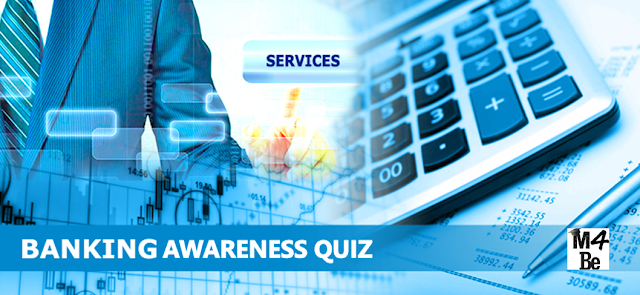1. Kisan Credit Cards (KCC) Scheme was formulated in the year:
a) 1996
b) 1997
c) 1998-99
d) 2000
e) None of the above
Answer:
c)
2. Expand CIN with respect to OLTAS.
a) Challan Identification Number
b) Challan Identification Notary
c) Channel Identification Number
d) Challan Inventory Number
e) None of these
Answer:
a)
a) capital reserve representing surplus arising out of sale proceeds of
assets
b) paid-up capital, statutory reserves and other disclosed free reserves,
if any
c) both (a) and (b)
d) either (a) and (b)
e) None of the above
Answer:
c)
4. What is the meaning of “I promise to pay” clause written on notes?
a) The bank’s obligation to pay the value of banknote does not arise out
of a contract but out of statutory provisions.
b) The bank’s obligation to pay the value of banknote does arise out of a
contract but not out of statutory provisions.
c) This obligation is neither due to a contract nor a statutory
provision.
d) It means that to pay you the value, there is sovereign guaranty.
e) None of these.
Answer:
a)
5. What is the name of technology given to the recently introduced
computerised clearance of cheques:
a) Automatic clearance
b) MICR
c) Speedline System
d) Special clearning
e) None of the above
Answer:
b)
6. To enforce law and order Government of India has many agencies. SFIO
is one of them. Expand it.
a) Serious Fraud Interrogation Office
b) Serious Fraud Investigation Office
c) Serious Feud Interrogation Office
d) Serious Fraud Interrogation Ordinance
e) None of these.
Answer:
b)
7. The government has allowed issue of Long- Term Bonds for Insurance
Companies and others upto:
a) 10 years
b) 15 years
c) 25 years
d) 30 years
e) None of the above
Answer:
c)
8. Consider these statements:-
Statement I – One rupee
note is the liability of GOI.
Statement II – Two rupee
note is the liability of RBI.
a) Both statements are true.
b) Both are false.
c) Statement I is true, whereas II is false.
d) Statement I is false, whereas II is true.
e) None of these.
Answer:
a)
9. Banking Regulation Act, 1949, does not at all apply to
a) nationalized banks
b) State bank of India and its subsidiaries
c) foreign banks having branches in India
d) Primary agricultural credit societies and cooperative land mortgage
banks
e) None of the above
Answer:
d)
10. Consider these statements:-
Statement I – Other than
Rs. 1000 note, the security threads of the banknotes contain the word “Bharat” in
Devanagari script and “RBI” alternatively.
Statement II – In Rs. 1000
note, the security thread contains the word “Bharat” in Devanagari script, “1000”,
and “RBI”.
a) Both are false.
b) Both are true.
c) Statement I is true but II is false.
d) Statement I is false but II is true.
e) None of these
Answer:
b)
11. A mortgage involves:
a) transfer of ownership
b) transfer of possession
c) transfer of interest
d) All of the above
e) None of the above
Answer:
c)
12. Banknotes can be issued in any denominations but coins can be issued
up to what denomination?
a) Rs. 5000
b) Rs. 1000
c) Rs. 500
d) Rs. 100
e) None of these
Answer:
b)
13. “Micro Credits”
are loans:
a) granted to distressed persons (other than farmers) to pre-pay their
debt to non-institutional lenders against appropriate collateral or group security
b) not exceeding Rs. 50,000 per borrower provided by banks
c) both (a) and (b)
d) None of the above
e) Cannot be determined
Answer:
c)
14. RBI issued its first banknote in Jan 1938 bearing the portrait of
George IV. What was its denomination?
a) Rs. 5
b) Rs. 10
c) Rs. 1
d) Rs. 2
e) None of these
Answer:
a)
15. Bank holidays under Section 25 of the Negotiable Instruments Act,
1881 are declared by:
a) State Government for the respective State
b) Banking Operations Department
c) Central Government
d) RBI
e) None of the above
Answer:
d)
16. The tax payers data flows directly from banks to Tax Information
Network (TIN. Who maintains TIN?
a) RBI
b) National Securities Depository Ltd.
c) National Securities Defense Ltd.
d) Enforcement Directorate
e) None of these
Answer:
b)
17. Which of the following is not included in “CAMELS”:
a) Capital Adequacy and Asset Quality
b) Management and Earning Performance
c) Employees Performance
d) Liquidity and Systems
e) None of the above
Answer:
c)
18. When were banknotes in the Mahatma Gandhi Series introduced?
a) 1991
b) 1995
c) 1996
d) 2000
e) None of these
Answer:
c)
19. “Ways and Means” advances are provided by Reserve Bank of India only
to:
a) central Government
b) State Government
c) Both (a) and (b)
d) None of the above
e) Cannot be determined
Answer:
c)
20. Consider these statements:-
Statement I – RBI decides
volume and value of banknotes to be printed.
Statement II – RBI decides
volume and value of coins to be minted.
a) Both are true.
b) Both are false.
c) Statement I is true, but statement II is false.
d) Statement I is false, whereas II is true.
e) None of these
Answer:
c)






